HOTL6003 Talent and Culture: Issues in MAdE Establishment - Report
VerifiedAdded on 2022/09/12
|5
|1293
|11
Report
AI Summary
This report provides a detailed analysis of the talent and culture issues at MAdE Establishment, focusing on the controversies surrounding George Calombaris. It begins with an introduction that sets the stage for the analysis of the issues using the PESTEL model. The body of the report delves into the key problems, including shareholders missing out on entitlements, significant underpayments, unfair compensation, employee discrimination and disrespect, incorrect employee classification, and flawed HR and payroll processes. Each issue is explored in detail, with references to the provided article and relevant literature. The report also offers recommendations for organizations to mitigate or avoid similar situations, emphasizing the importance of fair treatment and proper employee classification. The conclusion summarizes the implications of these issues for the global tourism industry, highlighting the importance of employee satisfaction and fair practices. Finally, the report includes a comprehensive list of references.
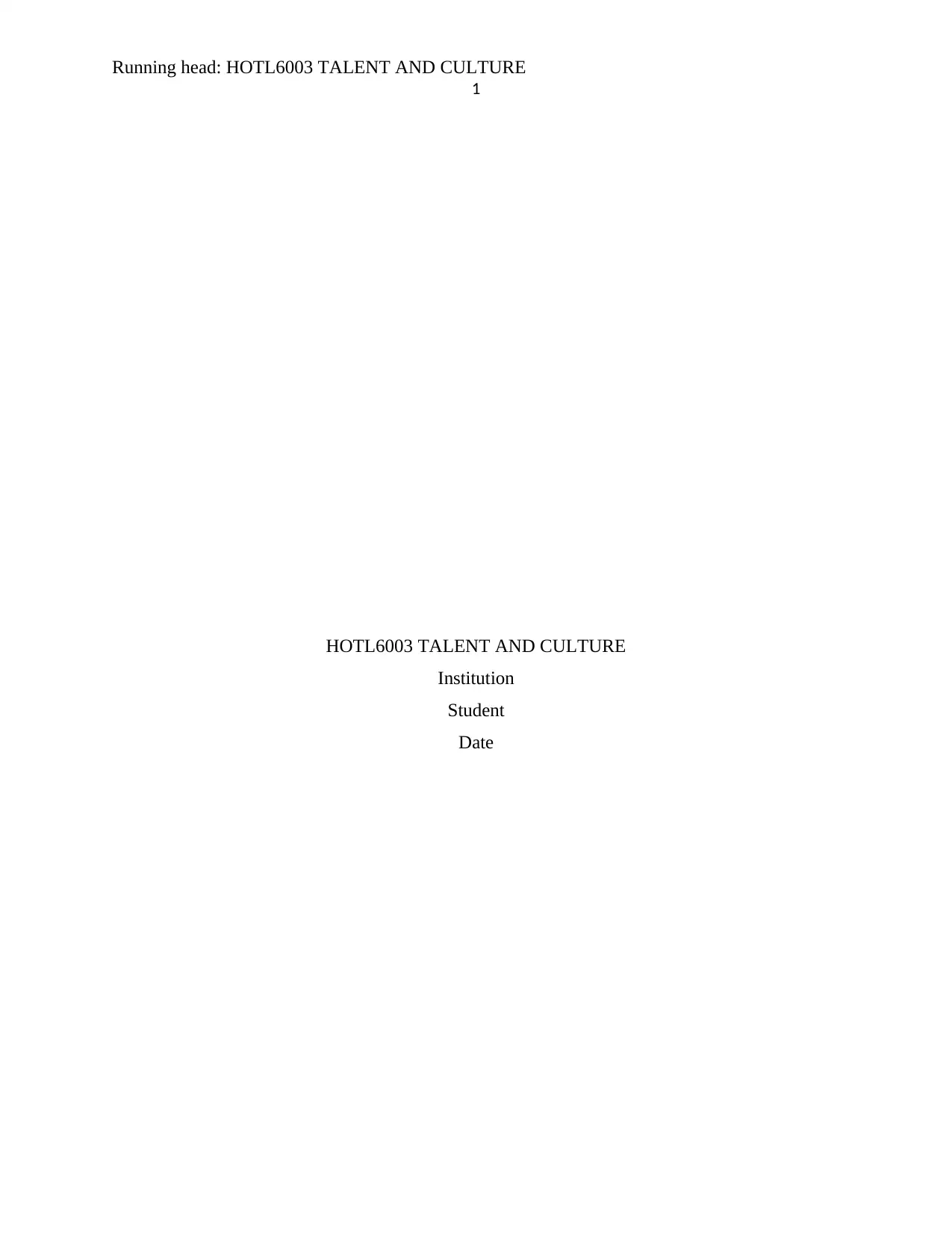
Running head: HOTL6003 TALENT AND CULTURE
1
HOTL6003 TALENT AND CULTURE
Institution
Student
Date
1
HOTL6003 TALENT AND CULTURE
Institution
Student
Date
Paraphrase This Document
Need a fresh take? Get an instant paraphrase of this document with our AI Paraphraser
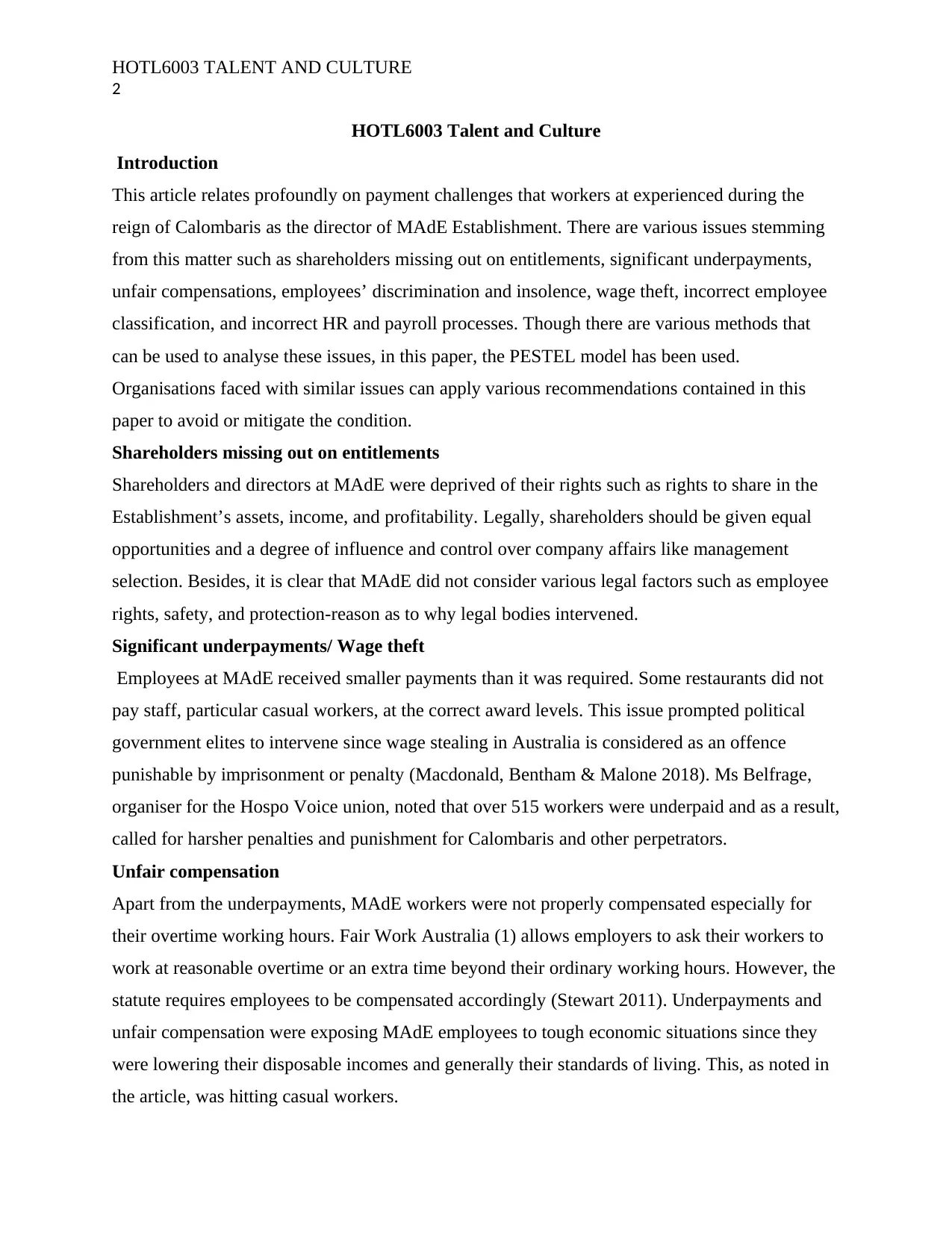
HOTL6003 TALENT AND CULTURE
2
HOTL6003 Talent and Culture
Introduction
This article relates profoundly on payment challenges that workers at experienced during the
reign of Calombaris as the director of MAdE Establishment. There are various issues stemming
from this matter such as shareholders missing out on entitlements, significant underpayments,
unfair compensations, employees’ discrimination and insolence, wage theft, incorrect employee
classification, and incorrect HR and payroll processes. Though there are various methods that
can be used to analyse these issues, in this paper, the PESTEL model has been used.
Organisations faced with similar issues can apply various recommendations contained in this
paper to avoid or mitigate the condition.
Shareholders missing out on entitlements
Shareholders and directors at MAdE were deprived of their rights such as rights to share in the
Establishment’s assets, income, and profitability. Legally, shareholders should be given equal
opportunities and a degree of influence and control over company affairs like management
selection. Besides, it is clear that MAdE did not consider various legal factors such as employee
rights, safety, and protection-reason as to why legal bodies intervened.
Significant underpayments/ Wage theft
Employees at MAdE received smaller payments than it was required. Some restaurants did not
pay staff, particular casual workers, at the correct award levels. This issue prompted political
government elites to intervene since wage stealing in Australia is considered as an offence
punishable by imprisonment or penalty (Macdonald, Bentham & Malone 2018). Ms Belfrage,
organiser for the Hospo Voice union, noted that over 515 workers were underpaid and as a result,
called for harsher penalties and punishment for Calombaris and other perpetrators.
Unfair compensation
Apart from the underpayments, MAdE workers were not properly compensated especially for
their overtime working hours. Fair Work Australia (1) allows employers to ask their workers to
work at reasonable overtime or an extra time beyond their ordinary working hours. However, the
statute requires employees to be compensated accordingly (Stewart 2011). Underpayments and
unfair compensation were exposing MAdE employees to tough economic situations since they
were lowering their disposable incomes and generally their standards of living. This, as noted in
the article, was hitting casual workers.
2
HOTL6003 Talent and Culture
Introduction
This article relates profoundly on payment challenges that workers at experienced during the
reign of Calombaris as the director of MAdE Establishment. There are various issues stemming
from this matter such as shareholders missing out on entitlements, significant underpayments,
unfair compensations, employees’ discrimination and insolence, wage theft, incorrect employee
classification, and incorrect HR and payroll processes. Though there are various methods that
can be used to analyse these issues, in this paper, the PESTEL model has been used.
Organisations faced with similar issues can apply various recommendations contained in this
paper to avoid or mitigate the condition.
Shareholders missing out on entitlements
Shareholders and directors at MAdE were deprived of their rights such as rights to share in the
Establishment’s assets, income, and profitability. Legally, shareholders should be given equal
opportunities and a degree of influence and control over company affairs like management
selection. Besides, it is clear that MAdE did not consider various legal factors such as employee
rights, safety, and protection-reason as to why legal bodies intervened.
Significant underpayments/ Wage theft
Employees at MAdE received smaller payments than it was required. Some restaurants did not
pay staff, particular casual workers, at the correct award levels. This issue prompted political
government elites to intervene since wage stealing in Australia is considered as an offence
punishable by imprisonment or penalty (Macdonald, Bentham & Malone 2018). Ms Belfrage,
organiser for the Hospo Voice union, noted that over 515 workers were underpaid and as a result,
called for harsher penalties and punishment for Calombaris and other perpetrators.
Unfair compensation
Apart from the underpayments, MAdE workers were not properly compensated especially for
their overtime working hours. Fair Work Australia (1) allows employers to ask their workers to
work at reasonable overtime or an extra time beyond their ordinary working hours. However, the
statute requires employees to be compensated accordingly (Stewart 2011). Underpayments and
unfair compensation were exposing MAdE employees to tough economic situations since they
were lowering their disposable incomes and generally their standards of living. This, as noted in
the article, was hitting casual workers.
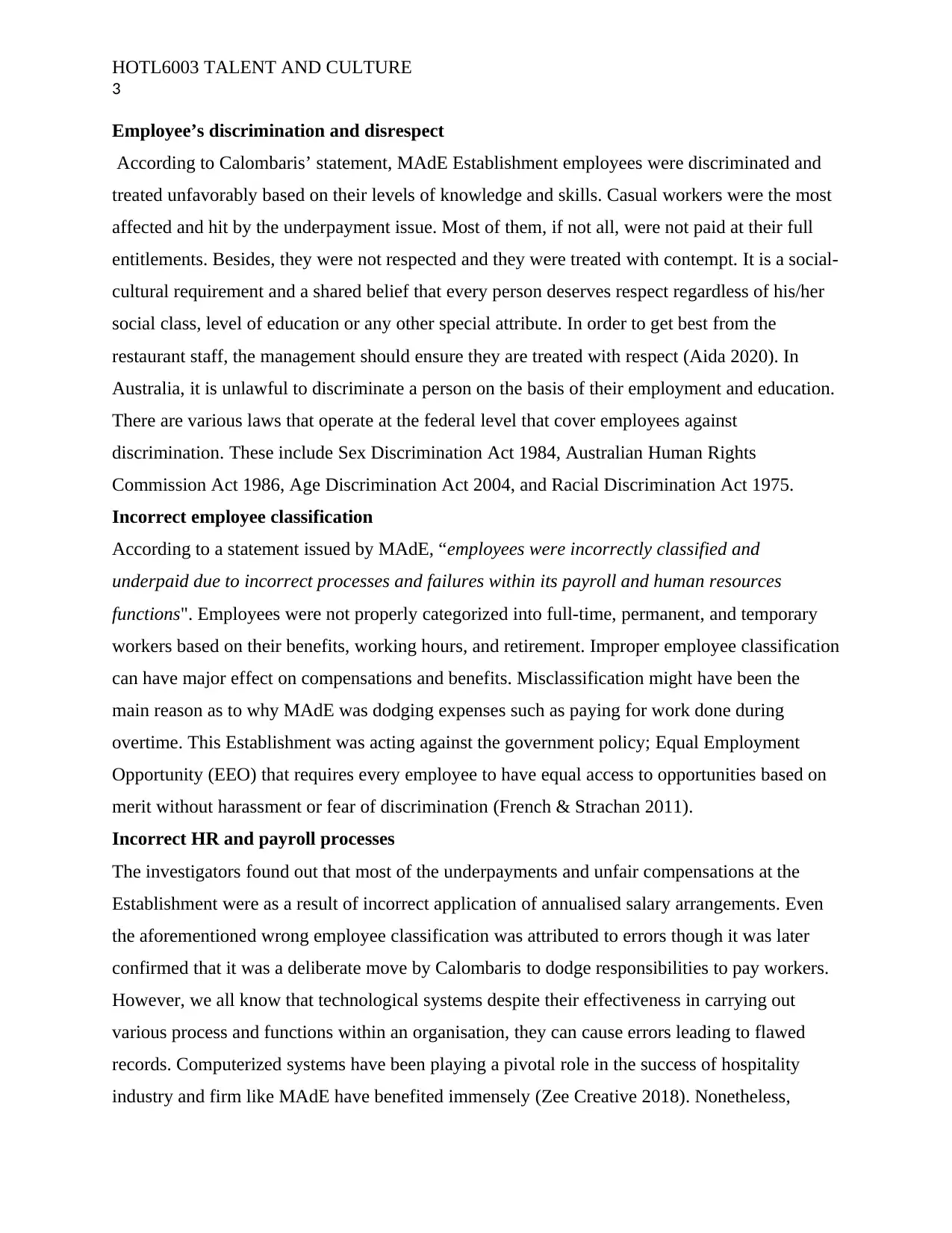
HOTL6003 TALENT AND CULTURE
3
Employee’s discrimination and disrespect
According to Calombaris’ statement, MAdE Establishment employees were discriminated and
treated unfavorably based on their levels of knowledge and skills. Casual workers were the most
affected and hit by the underpayment issue. Most of them, if not all, were not paid at their full
entitlements. Besides, they were not respected and they were treated with contempt. It is a social-
cultural requirement and a shared belief that every person deserves respect regardless of his/her
social class, level of education or any other special attribute. In order to get best from the
restaurant staff, the management should ensure they are treated with respect (Aida 2020). In
Australia, it is unlawful to discriminate a person on the basis of their employment and education.
There are various laws that operate at the federal level that cover employees against
discrimination. These include Sex Discrimination Act 1984, Australian Human Rights
Commission Act 1986, Age Discrimination Act 2004, and Racial Discrimination Act 1975.
Incorrect employee classification
According to a statement issued by MAdE, “employees were incorrectly classified and
underpaid due to incorrect processes and failures within its payroll and human resources
functions". Employees were not properly categorized into full-time, permanent, and temporary
workers based on their benefits, working hours, and retirement. Improper employee classification
can have major effect on compensations and benefits. Misclassification might have been the
main reason as to why MAdE was dodging expenses such as paying for work done during
overtime. This Establishment was acting against the government policy; Equal Employment
Opportunity (EEO) that requires every employee to have equal access to opportunities based on
merit without harassment or fear of discrimination (French & Strachan 2011).
Incorrect HR and payroll processes
The investigators found out that most of the underpayments and unfair compensations at the
Establishment were as a result of incorrect application of annualised salary arrangements. Even
the aforementioned wrong employee classification was attributed to errors though it was later
confirmed that it was a deliberate move by Calombaris to dodge responsibilities to pay workers.
However, we all know that technological systems despite their effectiveness in carrying out
various process and functions within an organisation, they can cause errors leading to flawed
records. Computerized systems have been playing a pivotal role in the success of hospitality
industry and firm like MAdE have benefited immensely (Zee Creative 2018). Nonetheless,
3
Employee’s discrimination and disrespect
According to Calombaris’ statement, MAdE Establishment employees were discriminated and
treated unfavorably based on their levels of knowledge and skills. Casual workers were the most
affected and hit by the underpayment issue. Most of them, if not all, were not paid at their full
entitlements. Besides, they were not respected and they were treated with contempt. It is a social-
cultural requirement and a shared belief that every person deserves respect regardless of his/her
social class, level of education or any other special attribute. In order to get best from the
restaurant staff, the management should ensure they are treated with respect (Aida 2020). In
Australia, it is unlawful to discriminate a person on the basis of their employment and education.
There are various laws that operate at the federal level that cover employees against
discrimination. These include Sex Discrimination Act 1984, Australian Human Rights
Commission Act 1986, Age Discrimination Act 2004, and Racial Discrimination Act 1975.
Incorrect employee classification
According to a statement issued by MAdE, “employees were incorrectly classified and
underpaid due to incorrect processes and failures within its payroll and human resources
functions". Employees were not properly categorized into full-time, permanent, and temporary
workers based on their benefits, working hours, and retirement. Improper employee classification
can have major effect on compensations and benefits. Misclassification might have been the
main reason as to why MAdE was dodging expenses such as paying for work done during
overtime. This Establishment was acting against the government policy; Equal Employment
Opportunity (EEO) that requires every employee to have equal access to opportunities based on
merit without harassment or fear of discrimination (French & Strachan 2011).
Incorrect HR and payroll processes
The investigators found out that most of the underpayments and unfair compensations at the
Establishment were as a result of incorrect application of annualised salary arrangements. Even
the aforementioned wrong employee classification was attributed to errors though it was later
confirmed that it was a deliberate move by Calombaris to dodge responsibilities to pay workers.
However, we all know that technological systems despite their effectiveness in carrying out
various process and functions within an organisation, they can cause errors leading to flawed
records. Computerized systems have been playing a pivotal role in the success of hospitality
industry and firm like MAdE have benefited immensely (Zee Creative 2018). Nonetheless,
⊘ This is a preview!⊘
Do you want full access?
Subscribe today to unlock all pages.

Trusted by 1+ million students worldwide
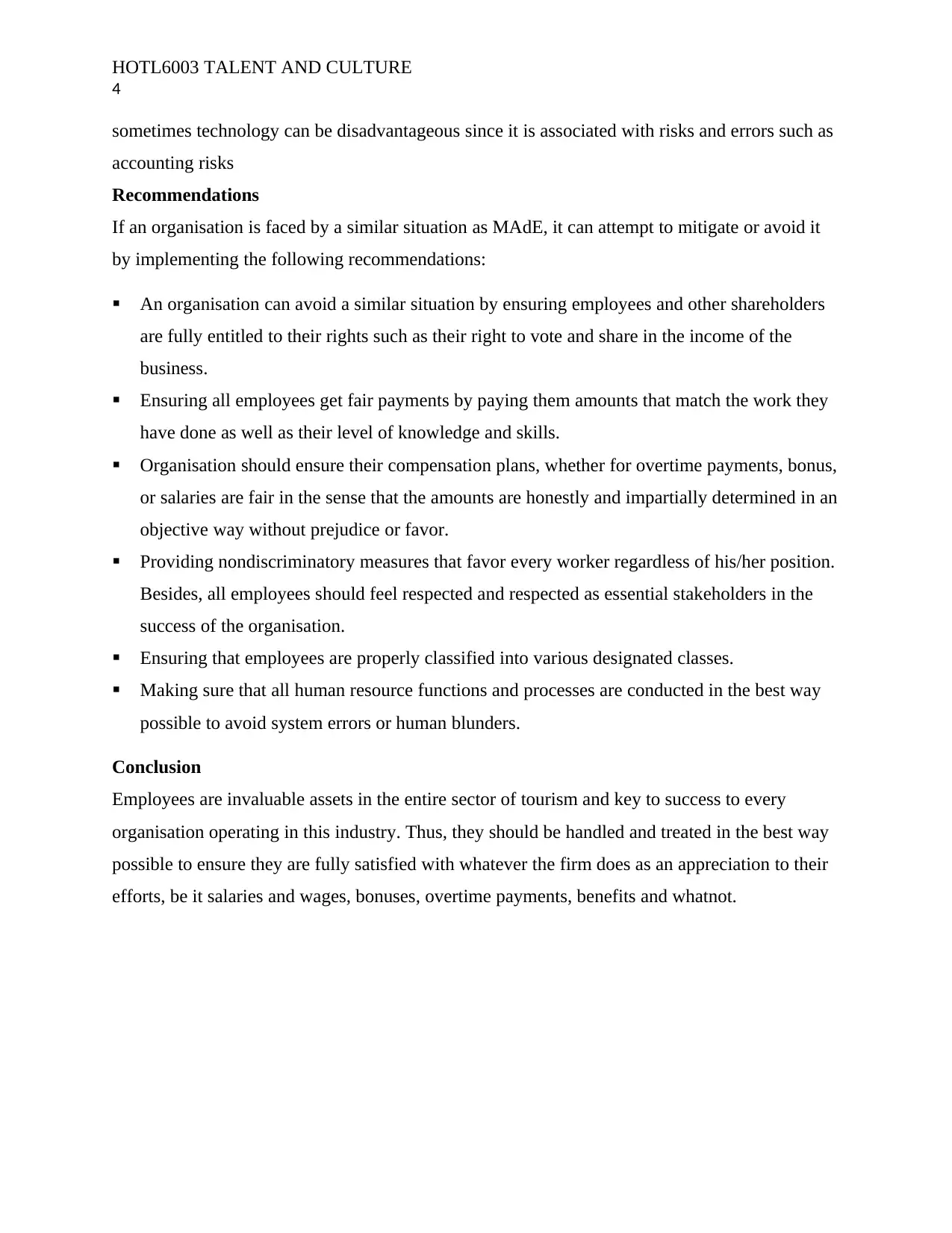
HOTL6003 TALENT AND CULTURE
4
sometimes technology can be disadvantageous since it is associated with risks and errors such as
accounting risks
Recommendations
If an organisation is faced by a similar situation as MAdE, it can attempt to mitigate or avoid it
by implementing the following recommendations:
An organisation can avoid a similar situation by ensuring employees and other shareholders
are fully entitled to their rights such as their right to vote and share in the income of the
business.
Ensuring all employees get fair payments by paying them amounts that match the work they
have done as well as their level of knowledge and skills.
Organisation should ensure their compensation plans, whether for overtime payments, bonus,
or salaries are fair in the sense that the amounts are honestly and impartially determined in an
objective way without prejudice or favor.
Providing nondiscriminatory measures that favor every worker regardless of his/her position.
Besides, all employees should feel respected and respected as essential stakeholders in the
success of the organisation.
Ensuring that employees are properly classified into various designated classes.
Making sure that all human resource functions and processes are conducted in the best way
possible to avoid system errors or human blunders.
Conclusion
Employees are invaluable assets in the entire sector of tourism and key to success to every
organisation operating in this industry. Thus, they should be handled and treated in the best way
possible to ensure they are fully satisfied with whatever the firm does as an appreciation to their
efforts, be it salaries and wages, bonuses, overtime payments, benefits and whatnot.
4
sometimes technology can be disadvantageous since it is associated with risks and errors such as
accounting risks
Recommendations
If an organisation is faced by a similar situation as MAdE, it can attempt to mitigate or avoid it
by implementing the following recommendations:
An organisation can avoid a similar situation by ensuring employees and other shareholders
are fully entitled to their rights such as their right to vote and share in the income of the
business.
Ensuring all employees get fair payments by paying them amounts that match the work they
have done as well as their level of knowledge and skills.
Organisation should ensure their compensation plans, whether for overtime payments, bonus,
or salaries are fair in the sense that the amounts are honestly and impartially determined in an
objective way without prejudice or favor.
Providing nondiscriminatory measures that favor every worker regardless of his/her position.
Besides, all employees should feel respected and respected as essential stakeholders in the
success of the organisation.
Ensuring that employees are properly classified into various designated classes.
Making sure that all human resource functions and processes are conducted in the best way
possible to avoid system errors or human blunders.
Conclusion
Employees are invaluable assets in the entire sector of tourism and key to success to every
organisation operating in this industry. Thus, they should be handled and treated in the best way
possible to ensure they are fully satisfied with whatever the firm does as an appreciation to their
efforts, be it salaries and wages, bonuses, overtime payments, benefits and whatnot.
Paraphrase This Document
Need a fresh take? Get an instant paraphrase of this document with our AI Paraphraser
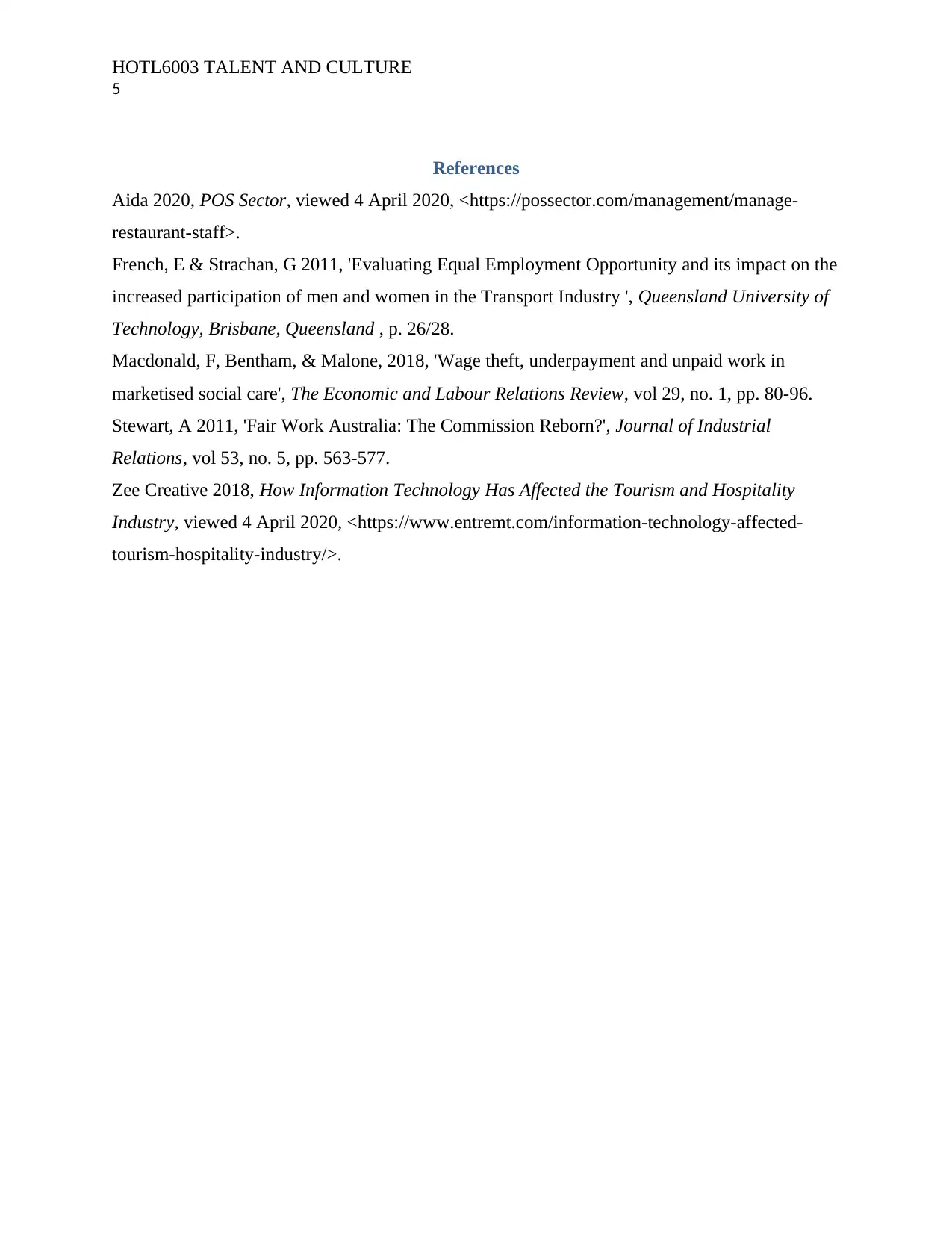
HOTL6003 TALENT AND CULTURE
5
References
Aida 2020, POS Sector, viewed 4 April 2020, <https://possector.com/management/manage-
restaurant-staff>.
French, E & Strachan, G 2011, 'Evaluating Equal Employment Opportunity and its impact on the
increased participation of men and women in the Transport Industry ', Queensland University of
Technology, Brisbane, Queensland , p. 26/28.
Macdonald, F, Bentham, & Malone, 2018, 'Wage theft, underpayment and unpaid work in
marketised social care', The Economic and Labour Relations Review, vol 29, no. 1, pp. 80-96.
Stewart, A 2011, 'Fair Work Australia: The Commission Reborn?', Journal of Industrial
Relations, vol 53, no. 5, pp. 563-577.
Zee Creative 2018, How Information Technology Has Affected the Tourism and Hospitality
Industry, viewed 4 April 2020, <https://www.entremt.com/information-technology-affected-
tourism-hospitality-industry/>.
5
References
Aida 2020, POS Sector, viewed 4 April 2020, <https://possector.com/management/manage-
restaurant-staff>.
French, E & Strachan, G 2011, 'Evaluating Equal Employment Opportunity and its impact on the
increased participation of men and women in the Transport Industry ', Queensland University of
Technology, Brisbane, Queensland , p. 26/28.
Macdonald, F, Bentham, & Malone, 2018, 'Wage theft, underpayment and unpaid work in
marketised social care', The Economic and Labour Relations Review, vol 29, no. 1, pp. 80-96.
Stewart, A 2011, 'Fair Work Australia: The Commission Reborn?', Journal of Industrial
Relations, vol 53, no. 5, pp. 563-577.
Zee Creative 2018, How Information Technology Has Affected the Tourism and Hospitality
Industry, viewed 4 April 2020, <https://www.entremt.com/information-technology-affected-
tourism-hospitality-industry/>.
1 out of 5
Your All-in-One AI-Powered Toolkit for Academic Success.
+13062052269
info@desklib.com
Available 24*7 on WhatsApp / Email
![[object Object]](/_next/static/media/star-bottom.7253800d.svg)
Unlock your academic potential
Copyright © 2020–2026 A2Z Services. All Rights Reserved. Developed and managed by ZUCOL.
